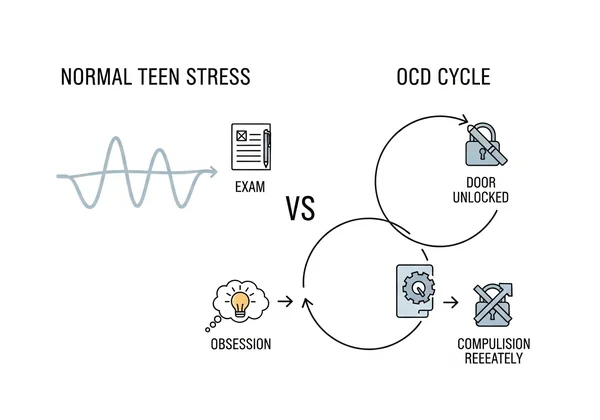青少年强迫症免费测试:症状、评估与支持
应对青少年时期对任何父母来说都可能如同置身迷宫。这是一个充满巨大变化、情绪波动和新焦虑的时期。但是,当您注意到您的青少年担忧似乎更加强烈,或者他们的习惯变得僵化和重复时,会发生什么呢?您并非唯一一个在想这是否是典型的青少年发展还是更严重的问题。如何判断自己或 青少年 是否患有强迫症?——这是许多担忧的父母寻求答案的问题。本指南旨在帮助您了解强迫症(OCD)如何独特地影响青少年,如何识别其症状,以及您可以采取哪些支持性措施来找到有效的帮助,首先从理解他们的经历开始。
青少年强迫症:识别其独特表现
青少年强迫症尤其难以察觉。它常常被正常的青少年焦虑所掩盖,或被视为一种“怪癖”而被忽视。与刻板印象中不断洗手的表现不同,青少年强迫症可以以许多不同的方式表现出来,其驱动力是侵入性思维(强迫观念)以及为 缓解 这些思维而进行的重复行为或心理活动(强迫行为)。识别这些模式是提供支持的关键第一步。初步了解信息的一个好方法是进行 在线强迫症测试。
孩子强迫症的微妙迹象
虽然有些强迫症的迹象是显而易见的,但许多是微妙且容易被忽视的。一个与强迫症抗争的青少年可能会因为尴尬或害怕被误解而成为隐藏其仪式的专家。除了显而易见的迹象,还要注意这些更细微的指标:

- 过度寻求保证: 不断询问诸如“你确定我锁门了吗?”或“你觉得我是个坏人吗?”之类的问题。这并非因为健忘;而是一种平息强迫性恐惧的强迫行为。
- 心理仪式: 您的青少年可能长时间“发呆”,但他们实际上可能正在进行无声的强迫行为,例如在脑海中重复短语、祈祷,或在脑海中复盘事件以确保他们没有犯错。
- 任务完成缓慢: 写作业、做家务或准备出门可能需要异常长的时间。这可能是由于与对称性、排序或必须达到‘刚刚好’的感受相关的强迫行为。
- 情绪波动: 当仪式被打断或强迫观念带来的焦虑变得难以承受时,可能会出现强烈的挫败感、易怒或情绪爆发。
强迫症如何影响学业和社交生活
强迫症的 症状 会消耗青少年大量的时间和精力,使他们难以跟上日常生活。其影响常常波及他们的学业和社交世界,造成显著的痛苦。

- 学业表现: 患有污染恐惧症的青少年可能会避免科学实验室。患有完美主义强迫观念的青少年可能会无休止地重写作业,导致错过截止日期。他们的注意力会急剧下降,因为他们的思维 被侵入性思维所占据。
- 社交退缩: 对评判的恐惧或在公共场合进行强迫行为的实际困难可能导致青少年避免朋友、聚会和课外活动。例如,关系型强迫症(R-OCD)可能导致他们对友谊或恋爱关系产生持续的怀疑和焦虑,从而导致他们疏远。了解这些症状是关键一步;您可以 获得初步见解 来开始这个过程。
区分强迫症与典型青少年焦虑
青少年为考试、社交接受度和未来担忧是完全正常的。那么,您如何区分典型的压力和潜在的疾病呢?关键区别在于思维和行为的功能与强度。青少年焦虑通常与现实世界的压力源相关,而强迫症则会产生一个侵入性思维和 缓解 性仪式的循环,这种循环让人感觉无法控制且不理性。
是正常的青少年压力还是持续的强迫症症状?
典型的青少年压力虽然具有挑战性,但通常是短暂的,并与特定情况相关。青少年可能会在一次大考前焦虑一周,但一旦考试结束,焦虑就会消退。然而,强迫症的特点是其持续性。

- 强迫观念: 这些不仅仅是担忧;它们是不想要的、反复出现的、令人痛苦的想法、图像或冲动。例子包括害怕伤害亲人、担心污染或需要完美的对称性。
- 强迫行为: 这些是青少年为了减少强迫观念引起的焦虑而被迫执行的重复性行为或心理活动。这种缓解只是暂时的,从而强化了循环。一个为考试感到压力的青少年会学习;一个患有强迫症的青少年可能需要花费数小时将他们的书桌摆放得完全对称,然后才能开始学习。
需要进一步调查的关键警示信号
如果您仍然不确定,这里有一些关键指标表明是时候深入探究了。这些警示信号表明这些行为可能超出了正常青少年发展的范围,并正在造成显著的功能损害。
- 时间消耗: 仪式和强迫观念每天占用超过一小时的时间。
- 显著痛苦: 思维和行为导致您的青少年出现明显的焦虑、恐惧、羞耻或普遍的不快乐。
- 功能受损: 他们参与学校活动、维持友谊或参与家庭活动的能力受到负面影响。
- 回避: 他们积极回避可能触发其强迫观念的人、地点或情境。
- 家庭卷入: 强迫行为开始涉及家庭成员,例如需要他人回答 寻求保证 的问题或参与清洁仪式。
如果这些迹象引起共鸣,一项保密且有科学依据的 青少年强迫症测试 可以作为一种有益的、非侵入性的方式来进一步探索这些症状。
考虑为青少年进行在线强迫症测试:您的第一步
意识到您的青少年可能正在与强迫症作斗争可能会让人不知所措,但以谨慎和策略的方式处理这种情况是关键。您的目标是打开沟通和支持的大门,而不是引起恐慌。这个旅程通常始于一次对话,然后以尊重青少年隐私和 感受 的方式收集更多信息。
开启对话:与您的青少年谈论您的担忧
选择合适的时机至关重要。找一个平静、私密且不会被打扰的时间。以同理心和观察为主导,而不是指责。
- 从“我注意到……”开始: “我注意到我们出门时你似乎压力很大,我想了解你有什么感受。”
- 肯定他们的感受: “听起来那一定非常累人和可怕。我在这里支持你,我们可以一起解决这个问题。”
- 避免贴标签: 不要说“我觉得你患有强迫症”,而是关注行为:“我看到你花了很多时间检查东西,这似乎让你很不开心。”
在线筛查工具的作用
开启对话后,建议进行免费强迫症测试或在线筛查可能是一个有价值的下一步。对于感到羞耻或否认的青少年来说,一个私密的在线工具比医生办公室感觉不那么令人生畏。这项免费在线强迫症测试基于既定的心理学原理提供保密的评估。它不是一个诊断工具,但它有几个重要的用途:

- 提供一个框架: 这些问题可以帮助您和您的青少年为他们以前无法表达的具体经历命名。
- 提供客观见解: 收到一份概述潜在症状模式的报告可以验证他们的挣扎,并使问题感觉更真实、更易于管理。
- 作为寻求专业帮助的桥梁: 结果可以作为与家庭医生或心理健康专业人士对话的具体起点。
您可以温和地建议将其作为一种共同学习的方式:“我找到了一个私密的在线工具,可以帮助人们更好地理解他们的想法和习惯。也许我们可以一起看看?”在我们的主页上探索 保密自测。
为您的青少年寻找有效的强迫症帮助
收集初步信息仅仅是开始。强迫症的真正康复需要专业的指导和强大的家庭支持系统。作为父母,您的职责是帮助引导这些后续步骤,并创造一个促进康复和韧性的环境。
寻求专业诊断和治疗方案
在线筛查工具可以为您指明方向,但正式诊断必须来自合格的心理健康专业人士,例如心理学家、精神科医生或持证治疗师。强迫症的金标准、循证治疗是一种认知行为疗法(CBT),称为暴露与反应预防(ERP)。
- ERP 疗法: 这种疗法包括逐步让青少年接触他们恐惧的想法或情境(暴露),同时抵抗执行强迫行为的冲动(反应预防)。这是一种高效但具有挑战性的疗法,它帮助大脑学习到所恐惧的结果并不会发生,并且他们能够忍受焦虑。
在整个旅程中支持您的青少年和家人
您的支持是青少年康复最有力的工具之一。这意味着您自己也要了解强迫症,调整家庭动态,并提供无条件的爱。
- 自我教育: 您对强迫症了解得越多,就越能为您的孩子争取权益,并区分疾病和他们真实的个性。
- 做一个教练,而不是参与者: 迁就仪式以缓解青少年即时痛苦是很诱人的,但这会无意中强化强迫症。与他们的治疗师合作,学习如何充满爱意且坚定地拒绝参与强迫行为。
- 赞扬努力,而非结果: 康复并非一帆风顺。即使他们未能完全抵抗强迫行为,也要庆祝他们面对恐惧的勇气。
- 为自己寻求支持: 支持患有强迫症的孩子可能会带来压力。考虑加入支持小组或寻求自己的治疗以保持韧性。
赋能青少年的成长之旅:父母的下一步
发现您的青少年可能患有强迫症是旅程的开始——一个通向理解、治疗和赋能的旅程。通过识别症状,将其与正常压力区分开来,并迈出温和的第一步,您已经走在了正确的道路上。请记住,强迫症是一种可治疗的疾病,通过正确的支持,您的青少年可以学会管理他们的症状,过上充实而充满活力的生活。
您的第一步是获取知识。如果您准备好更清楚地了解您所看到的症状,我们邀请您在我们的主页上 开始测试。这是一种免费、保密且富有洞察力的方式,可以开始这场重要的对话。
关于青少年强迫症的常见问题
青少年强迫症的常见诱因有哪些?
诱因可能因人而异,但通常与青少年时期常见的发育压力源有关。这可能包括学业压力、社交变化、荷尔蒙波动、创伤事件或责任增加。总的来说,压力是可能加剧强迫症症状的主要诱因。
我如何判断我的青少年的焦虑是否真的是强迫症?
主要区别在于强迫观念-强迫行为循环的存在。一般性焦虑通常涉及对现实生活问题的担忧,而强迫症则涉及侵入性的、通常是不理性的想法(强迫观念),并通过特定的、重复性的行为(强迫行为)来管理。如果您怀疑是强迫症,进行 在线强迫症测试 可以作为有用的第一步,以查看症状模式是否吻合。
青少年强迫症可以治愈吗?
虽然“治愈”可能是一个误导性的词语,但强迫症是高度可治疗的。通过有效的治疗,如 ERP,许多青少年可以将其症状减轻到不再显著影响他们生活的程度。目标是学会管理强迫症,使青少年能够掌控自己,而不是被疾病控制。
如果我的青少年拒绝寻求帮助,我该怎么办?
这是一个常见且困难的情况。首先要肯定他们的感受,避免施加压力。继续提供一个不带评判的交谈空间。您也可以向专门治疗强迫症和家庭动态的治疗师寻求指导。有时,第一步是父母学习改变家庭环境的策略,这反过来可能会促使青少年参与治疗。